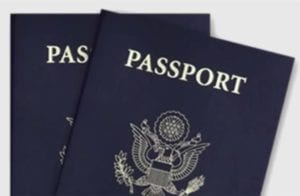US citizens traveling internationally sometimes encounter legal problems, medical emergencies, or a lost passport. It’s important to know what US embassy emergency services can be provided.
 Recently, Brittney Griner, a two-time Olympic gold medalist for the US, was arrested in Russia. Customs officials state that they detected cannabis oil in her luggage at the Sheremetyevo Airport outside Moscow. She was caught by a sniffer dog, followed by a hand search of her carry-on, revealing the “narcotic.” Can a citizen receive US embassy emergency services in this situation?
Recently, Brittney Griner, a two-time Olympic gold medalist for the US, was arrested in Russia. Customs officials state that they detected cannabis oil in her luggage at the Sheremetyevo Airport outside Moscow. She was caught by a sniffer dog, followed by a hand search of her carry-on, revealing the “narcotic.” Can a citizen receive US embassy emergency services in this situation?
Legal Emergencies:
If you’re a US citizen like Ms. Griner and were arrested, what would be the first thing you would do or ask a friend or family member to do for you?
If you encounter legal problems while traveling internationally, your first call should be the local embassy.
If it were me, I’d contact the US Embassy emergency services group in Moscow or have someone else do it for me. US embassy emergency services are limited but crucial for US citizens in legal trouble while traveling abroad.
US citizens need to understand that their citizenship grants them no special legal privileges whenever traveling internationally. Except for credentialed US diplomats, like the diplomats of other nations, we are all subject to the laws of the country in which we’re traveling. Often those laws are significantly different than in the US, and the sentences, if convicted, are much harsher. Moreover, in some countries, foreigners have fewer rights than citizens.
While there are many US embassy emergency services for US citizens in legal trouble, they can’t provide much.
The limited but invaluable services US embassies can provide to US citizens traveling abroad in case of legal emergencies include:
- Contacting your family, friends, and employer on your behalf.
- Explaining how the local criminal justice system and process work.
- Recommending local attorneys who speak English.
- Visiting you in jail to ensure you’re receiving adequate care and are not being abused.
- Helping to enable your family and friends to send you the necessary money.
In addition to what they can do, US embassies can’t post a bond to get you out of jail. They can’t pay your attorney fees and/or fines or other fees. Embassy personnel can’t provide you with legal advice or be your interpreter. The embassy and its personnel can’t intervene in the local justice system.
Medical Emergencies:
If you have a medical emergency abroad, the US embassy can offer little but decisive help. US embassy and consular officials can help you find local hospitals, clinics, doctors, and other medical services, as well as a local interpreter. When I had a potentially severe medical emergency in Peru many years ago, they helped me obtain medical services.
Fortunately, I knew what the US embassy could and couldn’t do for me. For example, they couldn’t pay the hospital, doctor fees, and pharmacy bill or pay for the follow-up examination several days later so I could get clearance to fly on the next leg of my journey.
In case of a medical emergency, one of the most critical limitations US embassies have is that they can’t help you pay your medical bills. It’s essential to have health insurance with international coverage.
Understanding that the US State Department can’t help you with your medical bills, I highly recommend purchasing travel insurance that includes medical coverage for your international journeys. Medical emergencies can be costly while abroad, and some travel insurance policies can provide advanced payments for medical emergencies that require hospitalization for more than 24 hours. While many US health insurance policies cover international medical expenses, they pay by reimbursement. Some policies provide more limited coverage with higher deductibles and copays than for medical services offered in the US. In addition, some US health insurance policies don’t cover medical services provided outside the US. Medicare, for example, doesn’t provide international coverage.
While travel medical insurance generally includes medical evacuation, some policies may not provide enough coverage. Make sure your travel medical insurance has enough coverage to pay for medical evacuation from any destination you may visit.
Every American traveling internationally should enroll in the State Department’s STEP program to ensure that they have the information they need to avoid travel problems.
Stay in contact with the US State Department:
Each time I travel internationally, I enter the details of my journey into the US State Department Smart Traveler Enrollment Program, STEP. The US State Department’s free service allows US citizens and nationals traveling abroad to receive critical information from destination embassies about safety conditions at your destination(s). That helps you make well-informed decisions before you leave.
Through STEP, Americans can receive critical travel advisories on their smartphones in real-time. Through the advisories, we can stay abreast of important breaking information needed to help make informed decisions about travel plans while abroad, including evacuation from our destination before conditions become untenable.
Emergency Evacuation:
Via the STEP system, US embassies and consulates obtain your contact information so that they can contact you in case of an emergency due to natural disasters, civil unrest, family emergencies, etc., to assist you. They can help family and friends contact you in case of an emergency. Once, American friends of mine were contacted by the State Department using the STEP program. The embassy arranged to evacuate them due to civil unrest that had turned violent. In their case, no commercial transportation options were available. Remember, however, that travelers must reimburse the government for any evacuation services they provide.
Generally, the State Department will only evacuate Americans during serious emergencies if no commercial transportation options are available.
The US State Department has arranged for evacuations for some complicated situations. Generally, if you need to leave your destination in an emergency, don’t count on the US embassy to do more than keep you informed of the situation and help you learn about possible commercial transportation options.
Other Emergencies:
US embassies and consulates can help you through other emergencies. Suppose you’re a victim of a crime. In that case, they can connect you with local attorneys who speak English, help you contact friends and family, recommend an interpreter, obtain medical services if necessary, contact local police and help obtain money from home. They can’t provide legal services, help recover stolen belongings, cancel your credit cards or pay any of your bills while you wait for money from home.
The embassies and consulates can replace your lost or stolen passport, but you’ll have to apply in person. At this point, you’ll likely need to bring a passport photo with you to accompany your replacement application.
US embassies can provide crucial help, but there’s no substitute for skillful planning by travelers themselves.
While US embassies and consulates can be of great help to Americans traveling abroad, they aren’t a substitute for skillful travel preparation. Make sure to obtain travel insurance, get STEP enrollment, have travel document backups, list an emergency phone number, etc. That preparation, as I discussed last month, should include enough planning to create a trip plan “B” and put it into action if necessary.
After many years working in corporate America as a chemical engineer, executive and eventually CFO of a multinational manufacturer, Ned founded a tech consulting company and later restarted NSL Photography, his photography business. Before entering the corporate world, Ned worked as a Public Health Engineer for the Philadelphia Department of Public Health. As a well known corporate, travel and wildlife photographer, Ned travels the world writing about travel and photography, as well as running photography workshops, seminars and photowalks. Visit Ned’s Photography Blog and Galleries.



